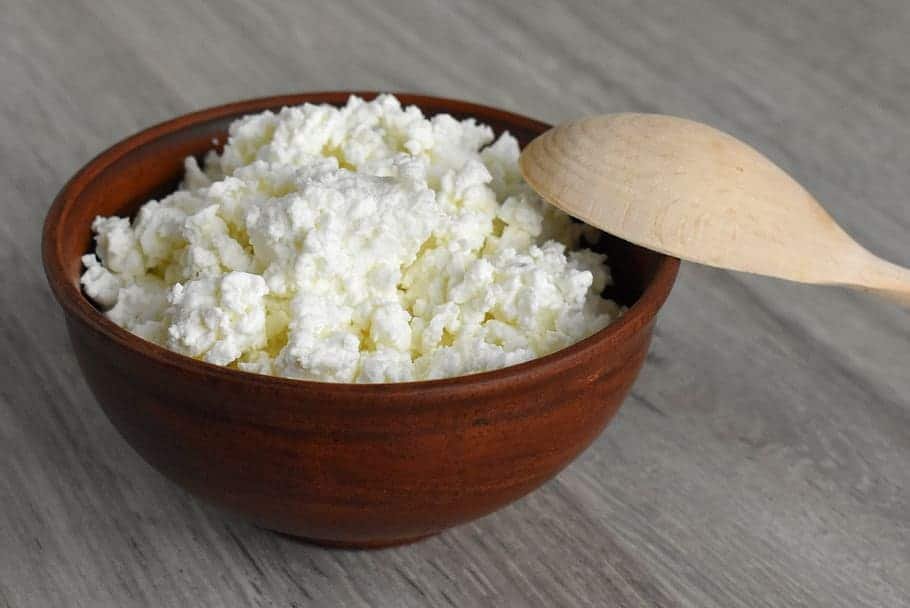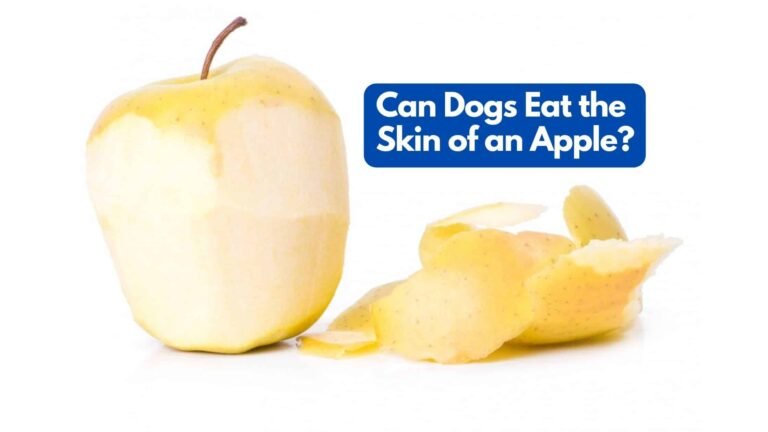Can Dogs Eat Cottage Cheese? A Complete Guide for Dog Owners

Cottage cheese is a popular dairy product that many people enjoy for its mild taste, creamy texture, and health benefits. But can dogs eat cottage cheese? Is it safe and healthy for them? How much cottage cheese can you give your dog? What are the risks and benefits of feeding your dog cottage cheese?
In this blog post, we will answer all these questions and more. We will also provide some tips on how to choose the best cottage cheese for your dog and how to introduce it to your dog’s diet. Let’s get started!
Can Dogs Eat Cottage Cheese?
Yes, dogs can eat cottage cheese in moderation. It is a good source of protein and calcium for dogs, and it can also be helpful for dogs with upset stomachs. However, it is important to choose plain, unflavored cottage cheese without any added sugar or spices. Cottage cheese that is flavored or sweetened with fruits, vegetables, or other ingredients may contain ingredients that are harmful to dogs.
Also, read about Dogs and Whipped Cream. How Safe Is It For Dogs?

Can Dogs Eat Cottage Cheese Daily?
Yes, dogs can eat cottage cheese daily but only in moderation. That is because it is a good source of protein and calcium for dogs. However, it should not make up more than 10% of your dog’s daily calorie intake. Also, ensure you only choose plain, unflavored cottage cheese without any added sugar or spices.
Is Cottage Cheese Safe for Dogs?
Cottage cheese is not toxic for dogs, instead, it can provide some nutritional benefits for them. However, there are some factors to consider before you give your dog cottage cheese, such as:
- Lactose Intolerance: Some dogs may have trouble digesting lactose in cottage cheese, leading to digestive issues like gas, bloating, diarrhea, or vomiting. Introduce gradually and monitor for intolerance signs.
- Fat Content: Cottage cheese is high in fat, which can cause weight gain, obesity, and trigger pancreatitis. Limit intake and opt for low-fat versions.
- Sodium Concerns: High sodium levels in cottage cheese can harm dogs with kidney or heart issues, causing dehydration, increased urination, or salt poisoning. Choose unsalted or low-sodium options.
- Additives Risk: Cottage cheese additives like preservatives or toxic ingredients (garlic, onion, etc.) can be harmful to dogs. Check labels for safety.
What are the Benefits of Cottage Cheese for Dogs?
Cottage cheese can offer some benefits for dogs if fed in moderation and with caution. Some of the benefits are:
- It is a good source of protein, which helps build and maintain healthy muscles, teeth, nails, and bones.
- It is rich in calcium, which supports strong bones and teeth, as well as heart health.
- It contains other vitamins and minerals, such as potassium, vitamin A, vitamin B12, and selenium, that promote overall wellness.
- It has digestive benefits, as it can help with stomach upset and diarrhea.
- It also has probiotic benefits, as it provides beneficial bacteria to the gut.
- It is low in fat and high in fiber, which makes it a healthy snack or treat for dogs.
How Much Cottage Cheese Can You Give Your Dog?
The amount of cottage cheese you can give your dog depends on several factors, such as your dog’s size, age, activity level, health condition, and dietary needs. As a general rule, cottage cheese should not make up more than 10% of your dog’s daily calorie intake.
For example, if your dog needs 600 calories daily, you can give him no more than 60 calories from cottage cheese, which is about 2 tablespoons of low-fat cottage cheese.
It is important to note that these are just general guidelines. The actual amount of cottage cheese that you can give your dog may vary depending on their individual needs and preferences. If you are unsure how much cottage cheese to give your dog, it is always best to consult your veterinarian.
Below is a table that shows how much cottage cheese you can give dogs of different sizes from small to giant dogs.
Table Showing How Much Cottage Cheese Can You Give Your Dog
| Dog Size | Daily Calories | Calories from Cottage Cheese | Amount of Cottage Cheese |
| Small (10 lbs) | 200 | 20 | 1 teaspoon |
| Medium (30 lbs) | 600 | 60 | 1 tablespoon |
| Large (60 lbs) | 1000 | 100 | 2 tablespoons |
| Giant (100 lbs) | 1600 | 160 | 3 tablespoons |
How to Choose the Best Cottage Cheese for Your Dog?
When buying cottage cheese for your dog, you should look for the following qualities:
- Low-fat or fat-free: Choose cottage cheese that is low in fat or fat-free to avoid excess calories and potential pancreatitis in your dog. Avoid cottage cheese that is made with whole milk or cream, or that has added butter or oil.
- Unsalted or low-sodium: Choose cottage cheese that is unsalted or low in sodium to prevent dehydration and salt poisoning in your dog. Avoid cottage cheese that has added salt or seasonings, such as garlic, onion, or herbs.
- Plain or natural: Choose cottage cheese that is plain or natural, without any artificial colors, flavors, preservatives, or sweeteners. Avoid cottage cheese that has added fruits, nuts, chocolate, or other ingredients that are not suitable for dogs.
- Fresh and refrigerated: Choose cottage cheese that is fresh and refrigerated, and check the expiration date before buying. Avoid cottage cheese that is moldy, sour, or spoiled, as it can cause food poisoning in your dog.
Read also: 6 Reasons To Give Dogs Sauerkraut
How to Feed Cottage Cheese to Your Dog
There are a few different ways to feed cottage cheese to your dog. You can mix it in with their regular food, give it to them as a treat, or use it to make a homemade dog treat.
If you are mixing cottage cheese in with your dog’s food, start by adding a small amount, and gradually increase the amount over time. You can also add other healthy ingredients to the cottage cheese, such as fruits, vegetables, or plain yogurt.
If you are giving cottage cheese to your dog as a treat, you can simply serve it plain or mix it with some of their favorite kibbles. You can also use cottage cheese to make homemade dog treats. There are many different recipes available online, but a simple recipe is to combine cottage cheese, peanut butter, and rolled oats.
Cottage Cheese for Dogs with Diarrhea
If your furry friend is experiencing diarrhea, you might want to consider adding cottage cheese to their diet. Cottage cheese contains protein, calcium, and probiotics that can help restore the balance of beneficial bacteria in the gut and improve digestion.
However, it is important to feed cottage cheese in small amounts, as too much can cause lactose intolerance or worsen diarrhea. Also, it is best to choose low-fat and low-sodium varieties to avoid any potential harm to your pet. You can mix cottage cheese with other bland foods like boiled chicken or rice to create a gentle meal that may be easier for dogs with diarrhea to digest.
Can Dogs Eat Cottage Cheese With Pineapple?
Cottage cheese with pineapple can be a tasty and nutritious treat for dogs, but only in small amounts and occasionally. Pineapple is high in vitamin C and fiber, which can benefit your dog’s immune system and digestion. However, too much pineapple can also cause diarrhea or stomach upset, so moderation is key.
To give your dog cottage cheese with pineapple, you can mix a small amount of each in a bowl and offer it as a special treat or reward. You can also use it as a topper for your dog’s dry food to add some moisture and flavor.
If your dog enjoys cottage cheese with pineapple, you can also try other healthy snacks for dogs, such as apples, bananas, carrots, blueberries, or pumpkins. These fruits and vegetables are rich in vitamins, antioxidants, and fiber, and can help keep your dog healthy and happy.
Is it Okay to Feed a Nursing Dog Cottage Cheese?
You may think that giving your dog cottage cheese when they are nursing puppies will help them, but it can actually harm them. Vets warn that too much calcium intake during lactation can interfere with the production of a hormone called parathyroid hormone, which can lead to low blood calcium levels in the mother dog. This can cause a life-threatening condition called eclampsia.
Therefore, you should avoid giving your dog too much cottage cheese while they are nursing. Instead, you should provide them with a well-balanced and nutritious diet that supports their health and the growth of their puppies. You should also consult with your veterinarian to ensure you’re giving your dog the appropriate amount of cottage cheese for their individual needs.

What Type of Dogs Should Avoid Dairy Products Like Cottage Cheese?
Dogs that should avoid dairy products include dogs that may have problems with dairy products, such as milk, cheese, or yogurt. This is because they cannot digest the sugar or the protein in them. This can make them feel sick or have stomach issues.
If you want to give your dog some dairy, you should check with your vet first and give them only a little bit. You should also choose dairy products that are low in fat and salt, and have good bacteria that can help your dog’s digestion.
You should avoid dairy products that have other things that are bad for dogs, such as chocolate or nuts. Dairy products are not necessary for your dog’s health, so you can leave them out if your dog does not like them or cannot eat them.
Homemade Dog Food Recipe with Cottage Cheese
Here is a recipe for homemade dog food with cottage cheese:
Ingredients:
- 1 cup cooked brown rice
- 1 cup cottage cheese
- 1 egg, hard-boiled and diced
- 1/2 cup cooked vegetables (such as carrots, peas, and broccoli)
- 1 tablespoon plain yogurt
- 1 teaspoon olive oil
- 1/2 teaspoon ground cinnamon
- 1/4 teaspoon ground nutmeg
Instructions:
- In a large bowl, combine the brown rice, cottage cheese, hard-boiled egg, vegetables, yogurt, olive oil, cinnamon, and nutmeg.
- Mix well until combined.
- Serve to your dog in a bowl or as a training treat.
This recipe is a good source of protein, calcium, fiber, and vitamins. It is also low in fat and sugar, making it a healthy option for dogs.
Tips for making homemade dog food with cottage cheese.
Here are some additional tips for making homemade dog food with cottage cheese:
- Use plain, unflavored cottage cheese without any added sugar or spices.
- Use cooked brown rice, as it is easier for dogs to digest than white rice.
- Add a variety of vegetables to your dog’s food to ensure that they are getting all the nutrients they need.
- Use a small amount of olive oil to add healthy fats to your dog’s food.
- Season your dog’s food with herbs and spices that are safe for dogs, such as cinnamon, nutmeg, and turmeric.
- Start by giving your dog a small amount of homemade dog food and gradually increase the amount over time.
- If your dog has any allergies or sensitivities, be sure to check with your veterinarian before adding any new foods to their diet.
With these tips in mind, you can easily make healthy and nutritious homemade dog food with cottage cheese.
Frequently Asked Question
Can dogs eat cottage cheese daily?
Yes, dogs can eat cottage cheese daily in moderation. It’s a good source of protein and calcium, but it should not exceed 10% of their daily calorie intake.
Is cottage cheese safe for lactose-intolerant dogs?
Some dogs with lactose intolerance might have trouble digesting cottage cheese. Monitor for any digestive issues and consult a vet before offering it.
Can I mix cottage cheese with my dog’s regular food?
Yes, you can mix small amounts of cottage cheese with your dog’s regular food as an occasional treat or dietary supplement.
Can puppies eat cottage cheese?
Puppies can have cottage cheese in moderation, but their sensitive stomachs may require a careful introduction. Consult your vet before adding it to their diet.
Can dogs with allergies eat cottage cheese?
Cottage cheese is generally considered safe for dogs with allergies, but individual reactions vary. Consult your vet and perform a gradual trial.
Can dogs with kidney problems eat cottage cheese?
Cottage cheese is high in phosphorus, which may be a concern for dogs with kidney issues. Consult your vet for personalized guidance.
Is flavored cottage cheese safe for dogs?
Plain, unflavored cottage cheese is safer for dogs, as added flavors might contain ingredients harmful to them. Stick to plain options to ensure their safety.
Conclusion
Cottage cheese can be a safe and healthy treat for dogs if fed in moderation and with caution. It can provide some protein, calcium, vitamin A, and fatty acids for your dog, and it can also be used as a training tool or a medication concealer.
However, you should also be aware of the potential risks of feeding your dog cottage cheese, such as lactose intolerance, high-fat content, high sodium content, and additives. You should always choose the best cottage cheese for your dog, introduce it gradually to his diet, monitor his health, and limit the frequency of feeding. You should also consult your veterinarian before giving your dog cottage cheese, especially if he has any medical conditions or food allergies.
We hope this blog post has answered all your questions about “Can dogs eat cottage cheese?” If you have any comments or suggestions, please feel free to share them below. Thank you for reading!





